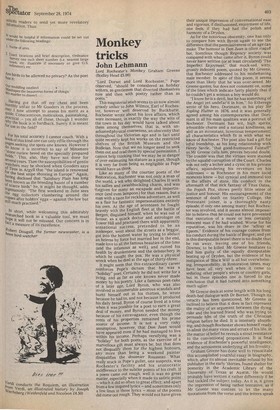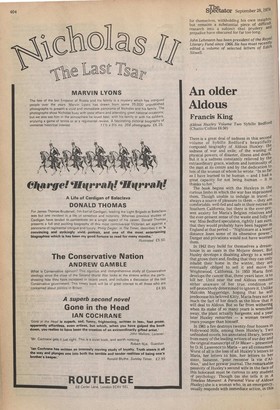Monkey tricks
John Lehmann
Lord Rochester's Monkey Graham Greene (Bodley Head £5.00) "Lord Dorset and Lord Rochester," Pope observed, "should be considered as holiday writers, as gentlemen that diverted themselves now and then with poetry 'rather than as poets."
This magisterial snub seems to us now almost grossly unfair to John Wilmot, Earl of Rochester, however well deserved by Buckhurst. Rochester wrote about his love affairs, which were incessant, in exactly the way the wits of the town in his day would have talked about them among themselves; that is, with unashamed physical coarseness, an obscenity that throughout the Victorian age and in fact until quite recently kept his works on the restricted shelves of the British Museum and the Bodleian. Now that we no longer need to seek them out and read them by special permission, I cannot help thinking that we may be in danger of over-estimating his stature as a poet, though it is very far from being as negligible as Pope would have us think.
Like so many of the courtier poets of the Restoration, Rochester was not only a man of the world, a wit who delighted Charles II with his sallies and swashbuckling charm, and was oforgiven for many an escapade and impertinence (and even lampoon) for that reason, but a man with a taste for reckless adventure, as well as a flair for fantastic impersonations entirely his own. At the age of seventeen he fought bravely with the English fleet at the battle of Bergen; disguised himself, when he was out of favour, as a quack doctor and astrologer on Tower Hill and practised there with apparently sensational success, pretended to be an innkeeper, went about the streets as a beggar, got into the hottest water by trying to abduct an heiress by force but married her in the end, made love to all the famous beauties of the time (and the infamous as well), and ruined his health by drunkenness and the debauchery in which he caught the pox. He was a physical wreck when he died at the age of thirty-three. It might seem that this extraordinary career reinforces Pope's dictum that he was a "holiday" poet. Certainly he did not write for a living, and as far as one knows never made money by his poetry. Like a famous poet-rake of a later age, Lord Byron, who was also involved in innumerable amorous scandals and burnt himself out in his thirties, he wrote because he had to, and not because it produced his daily bread. Byron of course lived at a time when it was possible for a poet to earn a great deal of money, and Byron needed the money because of his extravagance, even though the rents of his properties remained his prime source of income. It is not a very risky assumption, however, that Don Juan would have appeared even if he had managed to live within his income. Perhaps versifying was a "holiday" for both poets, as the exercise of a marvellous gift must always be; but that does not disqualify them for the highest honours, any more than being a weekend painter disqualifies the douanier Rousseau. What really stuck in Pope's gullet, one suspects, was Rochester's facility and his aristocratic indifference to the subtler points of his craft. If a poem came out rough, well it was no great matter, especially when it made its satiric point — which it did so often to great effect; and apart from a few inspired lyrics — and sometimes only a few lines in those lyrics — most of the poems did come out rough. They would not have given their unique impression of conversational ease and vigorous, if disillusioned, enjoyment of life, one feels, if they had had the polish and harmony of a Dryden. As for the notorious obscenity, one has only to compare him with Byron again to see the difference that the permissiveness of an age can make. The humour in Don Juan is often risqug but, licentious though Regency society was compared with what came after it, Byron could never have written (or at least circulated) The Imperfect Enjoyment,' that mock-sad, witty, grossly indecent poem, quoted by Mr Greene, that Rochester addressed to his misbehaving male member. In spite of this poem, it seems more than likely that he was over-sexed. Mr Greene quotes, but does not comment on, some of the lines which indicate fairly plainly that if he couldn't get a woman a boy would do.
"I know he is a devil, but he has something of the Angel yet undefac'd in him." So Etherege wrote of his hero, Dorimant, in his play Sir Fooling Flutter in 1676, and it was generally agreed among his contemporaries that Dori mant in all his main qualities was a portrait of Rochester. Dorimant has wit, high spirits, iifesistible charm and a natural kindliness, as *11 as an inconstant, licentious temperament; all characteristics which fit in with what we know of Rochester. The poet also had a gift for lopal friendship, as his long relationship with Henry Savile, "that good-humoured Falstaff" 01:Mr Greene calls him, proves beyond doubt.
The trouble was that the virtues were stained
bithe squalid corruption of the Court. Charles was not only a lecher and a cynic in his private affairs, squandering his revenues on his miStresses — as Rochester in his more lucid moments knew — but cynical and immoral too in the affairs of state. His conduct in the aftermath of that sick fantasy of Titus Oates, the Popish Plot, shows pretty little sense ot justice and honour. His encouragement of the sentence of death on Stanley College, the Protestant joiner, is a thoroughly nasty episode, if only one among many; but Roches ter was involved, and it seems almost impossible to believe that he could not have prevented that execution of a more or less certainly innocent man if he had wished. Worse for his reputation, was his share in the "affray at Epsom." Evidence of his courage comes from his conduct during the battle of Bergen; and yet in this disreputable brawl there is no doubt that he ran • away, leaving one of his friends, Downes,. to be killed. Mr Greene hesitates to find him guilty of the equally disreputable beating up of Dryden, but the evidence Of his instigation of 'Black Will' is all but overwhelm ing. Irresponsibility, in Restoration times, may have been all very well when it came to seducing other people's wives or country girls, but in these episodes one is forced to the conclusion that it had turned into something much uglier.
Mr Greene deals at some length with his long death-bed'dialogue with Dr Burnet. Though its . veracity has been questioned, Mr Greene is inclined to believe that it does in fact represent the reality.of an argument between the dying rake and the learned friend who was trying to persuade hrm of the truth of the Christian religion before he died. It is intensely absorb ing; and though Rochester shows himself ready to admit the many vices and errors of his life, in the matter Of belief he reveals a stout resistance to the conventional propositions. It is final evidence of Rochester's powerful intelligence, and the seriousness underlying all his frivolity.
Graham Greene has done well to resuscitate this accomplished youthful essay in biography, which, after its almost inevitable refusal by his publisher in the early 'thirties, found shelter for posterity in the Academic Library of the University of Texas at Austin. He would probably have written it rather differently if he had tackled the subject today. As it is, it gives the impression of being rather tentative, as if Mr Greene was content to let the many quotations from the verse and the letters speak
for themselves, withholding his own insights; but remains a substantial piece of difficult research into a subject that prudery and prejudice have obscured for far too long.
John Lehmann has been president of the Royal Literary Fund since 1966. He has most recently edited a volume of selected letters of Edith Sitwell.



































 Previous page
Previous page